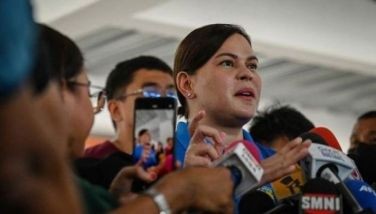PDAF releases by NCMF not part of the pork scam
Your banner headline and story of March 23, 2014 is deplorable in calling the PDAF projects that were downloaded to the National Commission on Muslim Filipinos (NCMF) a “scam,†and in maliciously dragging the Office of the President into the picture just because NCMF is among the Executive Offices.
It alleges that it is based on “the newest COA report, copies of which have been sent to the House†and links it to the “audit findings ... on Philforest†which are “contained in annual audit reports†in an obvious attempt to put NCMF in the same category of Philforest whose projects have been the subject of disallowances. The truth is it comes from NCMF’s resident auditor’s confidential Audit Observation Memoranda and 2012 Report meant as internal communication between the resident auditor and the NCMF for justification and submission of documents required by the resident auditor. It is not even a final audit of the funds as the resident auditor has suspended the audit to await the documents due by end of April this year.
Your story reeks with malice as it contains glaring misleading statements which your reporter Jess Diaz did not even verify with NCMF, in contravention of the journalist’s duty to ensure fairness and accuracy in his reports by obtaining information from all affected parties, like the NCMF in this case.
First, there are no Napoles NGOs in the NCMf PDAF projects, contrary to your reporter’s statement that “the funds ended up in 18 foundations and non-government organizations, some of which are identified with alleged pork barrel scam brains Janet Lim Napoles.â€
Second, it unfairly quotes the audit report saying that “the audit team noted that the memoranda of agreement (MOA) signed by NCMF, the lawmakers and their chosen NGOs lacked certain requirements prescribed in the circular†and generalizes that “many of the fund releases lacked supporting documents like contracts and purchase orders,†when the supposed requirements such as time schedules, reporting, monitoring and date of commencements and completion are part of the documents and work and financial plans and other submissions of the NGOs to the NCMF, while the alleged “fund releases†are covered by receipts submitted or to be covered by the documents that the NGOs have been given time to submit to complete the COA audit. Had your reporter verified from NCMF, we could have told him of the status of the COA report, and corrected his misimpressions on the same, including his misinformation on the NGOs.
We could have informed him that:
1. NCMF has been in the PDAF Menu of the General Appropriations Act for 2011 and 2012, hence it was natural for the lawmakers to course their PDAF through us.
2. The 2011-2012 PDAF projects in NCMF began during the administration of Bai Omera Dianalan-Lucman who was Secretary from March 2010 until my appointment as Secretary on April 13, 2012, and continued into my term with the introduction of more stringent accreditation and monitoring procedures.
3. While it is true that the lawmakers endorsed the NGOs (as this is a standard practice for soft projects even with COA Circular No. 2007-01), beginning with the PDAF projects undertaken during my term, we adopted an accreditation process that required the NGOs to submit 15 documents to prove their existence, eligibility and capability to undertake the project. These documents are as follows:
1. Certificate of SEC Registration;
2. Articles of Incorporation;
3. General Information Sheet duly notarized;
4. SEC Certificate of Good Standing or Non-Dissolution;
5. Board Resolution of the NGO indicating latest Election of Officers;
6. Audited Financial Statement for the past three years with initial of Independent Contractor on every page;
7. Statement of Management Responsibility on the Correctness of the Financial Statement of the NGO duly signed by its president and treasurer;
8. Business Permit (Mayor’s Permit and Barangay Clearance);
9. Certificate of Registration from the BIR;
10. Latest Tax Clearance Certificate;
11. Endorsement Letter from the Lawmaker and Authority to Release Funds;
12. Letter of Authority of representative of lawmaker;
13. Memorandum of Agreement;
14. Project Proposal; and
15. Work and Financial Plan.
In deference to the lawmakers, we gave weight to, but did not rely alone on, their endorsements. Instead, we conducted our own evaluation and accreditation, and in fact, disqualified some of the endorsed NGOs, like Kapuso’t Kapamilya Foundation which had projects under the previous administration.
Your news report is likewise unfair to the lawmakers it mentions because by naming them, while at the same time erroneously alleging that some of the NGOs are Napoles NGOs and indiscriminately labelling their projects as “pork scam,†they are being baselessly cast as culprits and prejudged in the bar of public opinion without presenting the facts involved.
The NCMF has already written and met with the NGOs that implemented the PDAF projects of these lawmakers, and urged them to comply with the COA observations. True to our accreditation, this proves that the NGOs we evaluated are existing organizations, as they have in fact implemented their projects and submitted liquidation papers that are now with our COA resident auditor.
Finally, the news report smacks of a demolition job against the undersigned at a time when the appointment of a new Secretary for the NCMF is up for decision by the President. It is not my nature to malign people, and I work solely on the basis of my qualifications and credentials in our continuing quest to reform the NCMF and uplift the condition of the Filipino Muslims. — MEHOL K. SADAIN, Secretary/CEO, National Commission on Muslim Filipinos
- Latest




















